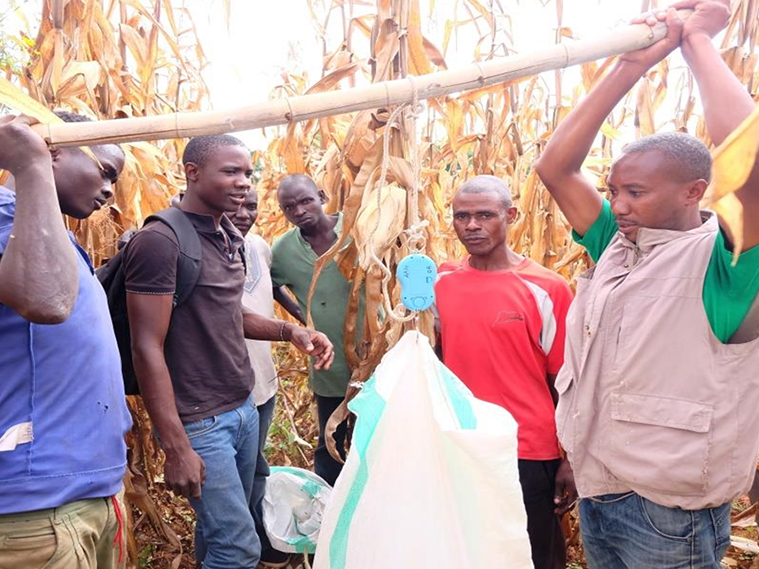By George Achia
African governments, regional economic communities, and development agencies have been urged to strengthen and harmonize biotechnology policies and biosafety regulations to create an enabling environment for biotechnology development in Africa.
It was revealed that less than 30 per cent of African countries have functional biosafety frameworks and the number of biotech products getting to farmers is still very low. Hence, a further call was made to fully integrate biotechnology into Africa’s agricultural development agenda to ensure that food and nutrition security is attained across the continent.
The calls were made by experts during a continental Consultative Roundtable on Agricultural Biotechnology, Innovation and Emerging Technologies for Africa’s Rural Economic Transformation, organised by the African Union Development Agency (AUDA-NEPAD) in collaboration with the AATF in October 2020. The Consultative roundtable was organized under the auspices of the Calestous Juma Executive Dialogues.
The high level consultative meeting, graced by a panel of renowned agricultural experts across Africa, recommended that African governments create an enabling policy environment to harness the benefits accruing from agricultural biotechnology, innovation and emerging technologies in order to transform the livelihoods of smallholder farmers in African countries.
Dr. Denis Kyetere, the Executive Director of AATF, noted that African leaders ought to promote a critical mass of expertise to enable the continent to exploit the benefits of the technology in improving agricultural productivity among farmers. He further encouraged more research and investment in the field.
“Despite the proven benefits of biotechnology, investment in research and development in agricultural biotechnology has been unpredictable, with majority of countries lagging in adoption of biotechnological products with only few crops advancing to commercialization,” said Dr. Kyetere.
He observed that the partnership between AATF and AUDA-NEPAD and other like-minded organizations, is key in pushing for agricultural technology development, adoption and addressing the challenges besetting the technology.
Ms Jennifer Chiriga, the Chief of Staff at AUDA-NEPAD pointed out that technology has been the most important singular driver of economic growth since World War II.
“It has been recognised that biotechnology plays a significant role in meeting the demand for industrial and agricultural production as well as medicine globally,” she noted.
At the policy level, she reiterated that potentially, genetically modified (GM) technology can make significant contributions towards the development of better health care and food security through sustainable agricultural practices as recognized by Agenda 21 of the United Nation Conference on Environment and Development, and African Union’s Agenda 2063 strategies.
Madam Chiriga also noted that benefits of biotechnology are concrete. However, the perceived risks associated with biotechnology remain hypothetical. “Nevertheless, it remains imperative to be proactive and recognizant of the perceived risks than wait until something goes wrong. Thereafter, attempt to address those damages. Hence, the need for more robust Africa’s research and development dialogue,” added Madam Chiriga.
Dr Mahama Ouedraogo, Director of the Human Resources, Science and Technology Directorate at the African Union Commission, called for the need to transform African agriculture, science, and emerging technologies such biotechnology. He noted that biotechnology presents an opportunity for African farmers to improve their seed quality and resilience as well as provide an efficient delivery system for water and nutrients. Furthermore, biotechnology offers smart food processing techniques and enhances precision farming that can potentially transform Africa’s agriculture.
“The importance of enhancing biotechnology development includes the movement of genetic materials across Africa to enable farmers’ access quality, high yielding, disease-tolerant, and resistant crop varieties. These genetic materials can boost Africa’s agricultural production and productivity, and reverse food insecurity,” Dr. Ouedraogo emphasized.
For African Member States to fully realize the benefit of biotechnology, Dr. Ouedraogo said that there is need to determine the extent to which the countries have implemented international instruments such as Cartagena Protocol. These instruments offer guiding principles on biotechnology and can help identify the challenges each country is facing to help countries address agricultural challenges.
On his part, Dr. Jeremy Ouedraogo, Head of the African Biosafety Network of Expertise (ABNE) at AUDA-NEPAD noted that the network has been supporting advancement of science and technology for agricultural development in member states through the establishment of functional biosafety systems.
“ABNE offers biosafety capacity strengthening services aimed at empowering African regulators with science-based information. The network draws on available expertise, resources, and infrastructure. ABNE also helps develop capacity and linkages within African and global institutions,” said Dr Ouedraogo. He added that the network also enables African countries harness modern agricultural biotechnology for improved food security, income, and livelihoods while minimizing potential risks to the environment and human health.
Dr. Francis Nang’ayo, Head of Regulatory Affairs at AATF, pointed out that frequent drought events due to the impact of climate change leads to low productivity. The low productivity is also attributable to poor soil nutrients and recycling of seed varieties for over 20 years without replacing with new improved varieties. These are some of the major agricultural challenges that biotechnology can address for Africa.
“Biotechnological crops have a proven potential towards addressing food security and impacts of climate change in Africa,” Dr Nang’ayo noted. He also added that biotechnology is not a panacea for Africa’s ills. But, it is an important tool in the technology tool kit that can be utilised by Africans to effectively address agricultural productivity.
Dr Nangayo said that the biotechnology interventions that have been used to address the major agricultural challenges that Africa is facing have resulted to the development and commercialization of maize varieties that are resistant to drought and insects. For instance, the cowpea variety is resistant to insects. On the other hand, the rice variety can enhance nitrogen use in the soil, water efficient and tolerant to salt.
Dr John Mukuka, a Seed Development Expert at ACTESA, noted that regional harmonization should be executed in phases. It can start with those countries and regions that are ready and have the potential and interest to commercialize their product. He further called for the need to develop standard operating procedures and the standardization of the application forms and experimental procedures. These measures can allow for data transportability among African countries.
In conclusion, the experts stated that there is a need for African countries to consider biotechnology as a tool towards addressing food insecurity. Evidence-based research have clearly demonstrated that generically modified crops are drought resistant, increases productivity and can enhance Africa’s food security. Thus, there was a call by experts for African countries to enhance and update their policy and regulatory frameworks to address agricultural challenges due to climate change and promote utilization of biotechnology.



















































































